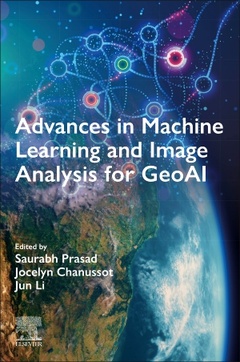Advances in Machine Learning and Image Analysis for GeoAI
Coordonnateurs : Prasad Saurabh, Chanussot Jocelyn, Li Jun

Advances in Machine Learning and Image Analysis for GeoAI provides state-of-the-art machine learning and signal processing techniques for a comprehensive collection of geospatial sensors and sensing platforms. The book covers supervised, semi-supervised and unsupervised geospatial image analysis, sensor fusion across modalities, image super-resolution, transfer learning across sensors and time-points, and spectral unmixing, among other topics. The chapters in these thematic areas cover a variety of algorithmic frameworks such as variants of convolutional neural networks, graph convolutional networks, multi-stream networks, Bayesian networks, generative adversarial networks, transformers, and more. This book provides graduate students, researchers, and practitioners in the area of signal processing and geospatial image analysis with the latest techniques to implement deep learning strategies in their research.
1. Introduction 2. Deep Learning for Super-resolution in Remote Sensing 3. Few-Shot Open-Set Recognition of Hyperspectral Images 4. Deep Semantic Segmentation Networks for GeoAI: Impact of Design Choices on Segmentation Performance 5. Estimation of Class Priors for Improving Classification Accuracy 6. Benchmarking and end-to-end considerations for GeoAI-enabled decision making 7. Explainable AI for Earth Observation: Current Methods, Open Challenges, and Opportunities 8. Self-supervised Contrastive Learning for Wildfire Detection: Utility and Limitations 9. Multi-Modal Deep Learning for GeoAI 10. The Power of Voting - Ensemble Learning in Remote Sensing 11. Language and Remote Sensing 12. Spectral Unmixing for Geospatial Image Analysis 13. Applying GeoAI for Effective Large-Scale Wetland Monitoring 14. Leveraging ML approaches for scaling climate data in an atmospheric urban digital twin framework
Jocelyn Chanussot (IEEE Fellow) has been with Grenoble INP since 1999, where he is currently a Professor of signal and image processing. His research interests include image analysis, hyperspectral remote sensing, data fusion, machine learning and artificial intelligence. He has been a visiting scholar at Stanford University (USA), KTH (Sweden) and NUS (Singapore) and is an Adjunct Professor of the University of Iceland. In 2015-2017, he was a visiting professor at the University of California, Los Angeles. He holds the AXA chair in remote sensing and is an Adjunct professor at the Chinese Academy of Sciences, Aerospace Information research Institute, Beijing. Dr. Chanussot is the founding President of IEEE Geoscience and Remote Sensing French chapter for which he which received the 2010 IEEE GRS-S Chapter Excellence Award. He was also the Vice-President of the IEEE Geoscience and Remote Sensing Society, in charge of meetings and symposia; the General Chair of the first IEEE GRSS Workshop on Hyperspectral Image and Signal Processing, Evolution in Remote sensing; Chair and Cochair of the GRS Data Fusion Technical Committee.
Jun Li (IEEE Fellow) is a Professor with
- Covers the latest machine learning and signal processing techniques that can effectively leverage geospatial imagery at scale
- Presents a variety of algorithmic frameworks, including variants of convolutional neural networks, multi-stream networks, Bayesian networks, and more
- Includes open-source code-base for algorithms described in each chapter
Date de parution : 06-2024
Ouvrage de 364 p.
15x22.8 cm
Thème d’Advances in Machine Learning and Image Analysis for GeoAI :
Mots-clés :
<; P>; GeoAI; Deep Learning; Geospatial Image Analysis; Remote Sensing; Data Fusion<; /P>
